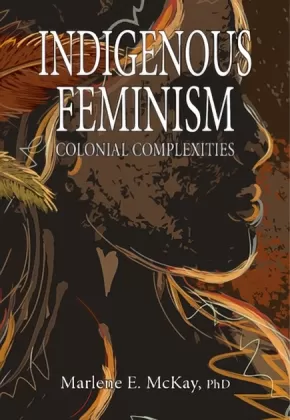Marlene McKay
Marlene McKay, PhD, was raised by strong Indigenous women within a Cree community in northeastern Saskatchewan. Cree is her first language. Christianity was, and still is, an influence in both the family and community. It is in this institution she came to realize that Christianity is a double edged sword. While it is a source of fellowship support, it is also an institution that imposes ideas of worthy and unworthy bodies.
For a number of years, Marlene worked as a social worker, serving mostly single-parent Indigenous women. It was while working as a social worker that Marlene learned about Indigenous traditions. However, the way in which men and women were positioned created a divide wherein men are given power and freedom while women have rules to follow. Although open to Indigenous customs, she soon realized the ways in which rules were communicated to Indigenous women often seem hostile. The plight of Indigenous women is not easily summed when the rules and societal norms imposed upon us are insidious. When we follow some rules, others are used to dismiss us.
Marlene entered the teaching profession after working as a social worker/counsellor for about 15 years. She has four earned university degrees. Marlene’s education focuses on Indigenous feminism, social justice, anti-racist education, and as a Cree speaker herself, she has a deep commitment to Aboriginal literacy. Her research was motivated by observing and experiencing marginalization, and she asserts that subjugation is influenced by identity categories of race, class status, gender. She further argues that one’s speech is also used to categorize people. Marlene has taught at the University of Saskatchewan and the University of Alberta. Marlene currently teaches within the Faculty of Social Work at the University of Regina.
Although Marlene returns to her home community regularly, she lives in Saskatoon, Saskatchewan. She has a network of family and friends in the city and holds Saskatchewan as home. Marlene is a proud Cree speaking Indigenous feminist – it is a place she struggled to find.
Books (1)
Synopsis:
Indigenous Feminism: Colonial Complexities involves naming the ways that Indigenous women, with a focus on northern Saskatchewan, are caught up at every moment in ideas and beliefs about who we are; as much as we know differently, the power of these ideas continues to press on us in all kinds of large and subtle ways. The resistance to the power of these ideas and their impact on the lives of Indigenous women has a long history, but the racism continues. The book makes a contribution toward naming the power of racism and patriarchy within Indigenous communities.
Reviews
"McKay’s Indigenous Feminism: Colonial Complexities is a layered, methodical theoretical exploration of how the powerful forces and continually created discursive practises of colonialism, Christianity, the Indian Act and Indigenous knowledge systems influence single parent, northern Saskatchewan Indigenous women’s identities and relationships in complex and sometimes contradictory ways. The women’s visions of a better future anchor their decision-making as they swim against and through the overwhelming systemic legacy of oppressive forces running through their lives and that sometimes jeopardize their relationships." - Rita Bouvier, semi-retired Metis educator and poet
Additional Information
139 pages | 6.00" x 9.00"







